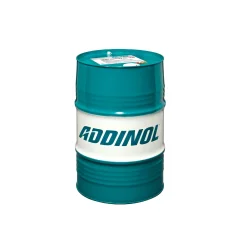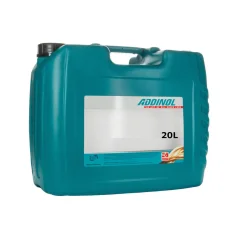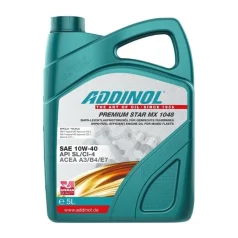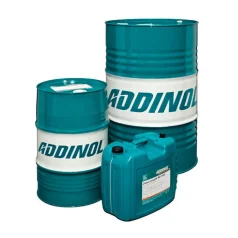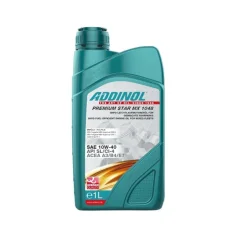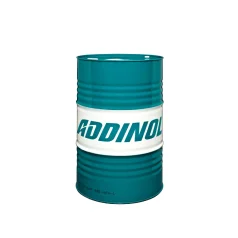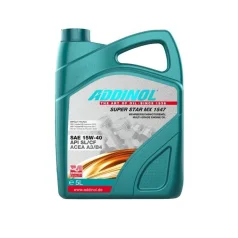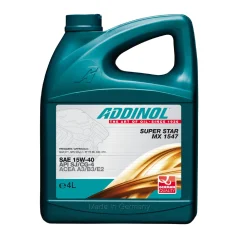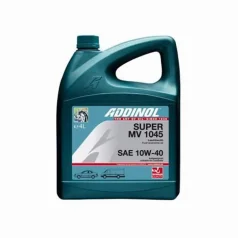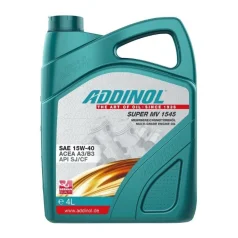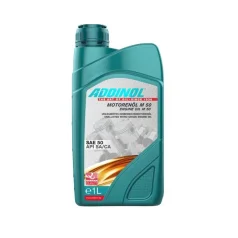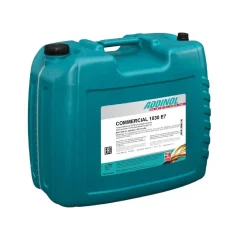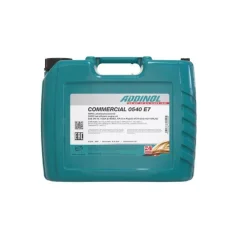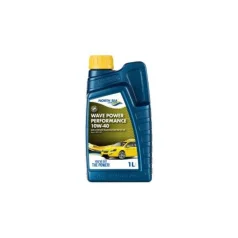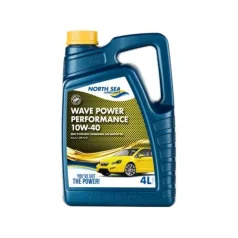Engine Oils
(288)Engine Oils – Reliable Protection for Vehicles and Machinery
At M&M Intercom, we offer premium engine oils for passenger and commercial vehicles, industrial machinery, motorcycles, and vintage cars. Our oils ensure full engine protection, reduce wear, and improve performance under all operating conditions.
With carefully selected formulations from renowned manufacturers such as Addinol, Agip, Castrol, CAT, ENI, Fuchs, INA Maziva, Mobil, NSL, Shell, and Total, we provide quality verified by the highest international standards.
Our engine oils are suitable for a wide range of applications – from passenger cars, delivery vans, tractors, and construction equipment to motorcycles and vintage vehicles. Available in various package sizes, from 1L to 1000L, they are perfectly adaptable to individual user and workshop needs.
Engine Oils for Passenger and Light Commercial Vehicles
For modern gasoline and diesel engines in passenger and light commercial vehicles, we offer a wide range of viscosities according to SAE standards such as 0W-20, 0W-30, 0W-40, 5W-30, 5W-40, 10W-40, and 10W-60.
These oils are designed to reduce friction, extend engine life, and lower fuel consumption. Complying with ACEA A3, A5, B3, B4, B5, C2, C3, C5 and API SN, SP, SL, and other specifications, they meet the latest requirements of modern engines while providing optimal protection against wear and deposits.
Engine Oils for Trucks and Heavy-Duty Machinery
In the segment of trucks, tractors, construction, and industrial machines, we offer oils that comply with ACEA E2, E4, E5, E6, E7, E8, E9, and E11 as well as API CH-4, CI-4, CJ-4, CK-4, and FA-4 standards.
These oils are intended for high-load engines operating under extreme conditions, where oxidation resistance, engine cleanliness, and piston ring protection are essential.
They are available in drums, 20L cans, 60L barrels, or larger IBC containers, suitable for workshops and large fleets.
Engine Oils for Motorcycles
For motorcycle enthusiasts, we offer a special selection of motorcycle engine oils that comply with JASO standards – for two-stroke engines: FA, FB, FC, FD and for four-stroke engines: MA, MA-1, MA-2, MB.
These oils ensure full compatibility with wet clutches and prevent slippage – a key factor for safe and reliable riding.
Available viscosities include 5W-30, 5W-40, 10W-30, 10W-40, 10W-50, 10W-60, 15W-50, 15W-40, and 20W-50, ensuring a stable film even at high temperatures and engine speeds.
Engine Oils for Classic and Vintage Vehicles
For vintage vehicle enthusiasts, we offer special oils designed to combine traditional formulations with modern technology.
Oils such as SAE 30, SAE 50, 10W-30, 15W-40, 10W-40, and 20W-50 (Addinol Legends) are produced without modern additives that could harm older seals and materials. They maintain the original engine characteristics, protect against corrosion, and ensure smooth operation of classic powertrains.
Engine Oil Standards and Specifications
Each engine oil in our range meets international standards of quality and performance. The main standards covered include:
- ACEA Standards: A3, A5, B3, B4, B5, C1–C5, E2–E11
- API Standards: CA to SP, including CI-4 Plus and CK-4
- JASO Standards: FB, FD, MA-2
|
ACEA sequence |
Area of application/requirements |
| A3/B3 | HTHS viscosity of ≥ 3.5 mPas, less evaporation losses, high piston cleanliness and oxidation stability, expires 2023 |
| A3/B4 | HTHS viscosity ≥ 3.5 mPas, meets requirements for direct injection diesel engines |
| A5/B5 | HTHS viscosity of 2.9-3.5 mPas, other standards correspond to A3/B4 |
| A7/B7 | High SAPS with low speed pre-ignition and wear protection for turbocharged DI gasoline engines as well as turbocharger compressor deposit (TCCD) protection for modern DI diesel engines |
| C1 | Low SAPS, sulfated ash content max. 0.5%, HTHS ≥ 2.9 mPas, expires 2023 |
| C2 | Mid SAPS, sulfated ash content max. 0.8%, HHTS ≥ 2.9 mPas |
| C3 | Mid SAPS, sulfated ash content max. 0.8%, HHTS ≥ 3.5 mPas |
| C4 | Low SAPS, sulfated ash content max. 0.5%, HHTS ≥ 3.5 mPas |
| C5 | Mid SAPS, sulfated ash content max. 0.8%, HTHS ≥ 2.6 < 2.9 mPas |
| C6 | Providing low speed pre-ignition and wear protection for turbocharged DI gasoline engines as well as diesel turbocharger compressor deposit (TCCD) protection for low SAPS class, compatible with catalyst & GPF/DPF exhaust aftertreatment systems |
| E4 | Based on MB 228.5, long oil change intervals, suitable for EURO III engines |
| E6 | Recommended for EGR engines and SCR NOX engines with DPF in combination with sulphur-free fuel, sulphate ash ≤ 1%, expires 2022 |
| E7 | Recommended for EGR engines and SCR NOX engines without DPF, sulphate ash ≤ 2% |
| E8 | Replaces ACEA E6, UHPD, Low SAPS, for DPF, HHTS ≥ 3.5 mPas |
| E9 | For a variety of EGR and SCR NOX engines with/without DPF using sulphur-free fuel, sulphate ash ≤ 1%, expires 2022 |
| E11 | Replaces ACEA E9, SHPD, Mid SAPS, for DPF, HHTS ≥ 3.5 mPas |
These specifications ensure our oils are suitable for European, American, and Asian vehicles, covering a broad spectrum of engine technologies.
Viscosity and Choosing the Right Oil
| SAE class | Borderline pumping temperature in °C | Kinematic viscosity in mm²/s |
| 0W | -40 | ≥ 3.8 |
| 5W | -35 | ≥ 3.8 |
| 10W | -30 | ≥ 4.1 |
| 15W | -25 | ≥ 5.6 |
| 20W | -20 | ≥ 5.6 |
| 25W | -15 | ≥ 9.3 |
| 8 | - | 4.0 – 6.09 |
| 12 | - | 5.0 – 7.09 |
| 16 | - | 6.1 – 8.19 |
| 20 | - | 6.9 – 9.29 |
| 30 | - | 9.3 – 12.49 |
| 40 | - | 12.5 – 16.29 |
| 50 | - | 16.3 – 21.89 |
| 60 | - | 21.9 – 26.09 |
Viscosity is a key factor when selecting engine oil. Our range includes oils with SAE ratings such as 0W-20, 5W-30, 10W-40, and 15W-50, which indicate performance at low and high temperatures.
Our experts can help you choose the right oil based on engine type, vehicle model year, and operating conditions.
For demanding users, we also offer mineral, semi-synthetic, and fully synthetic oils that ensure optimal lubrication in all conditions – from city driving to heavy industrial applications.
Why Choose M&M Intercom Engine Oils
Our advantage lies in a comprehensive selection that includes all types of engine oils for vehicles and machinery, verified manufacturers, and professional technical advice.
With consistent stock availability, quick response times, and the possibility of ordering larger quantities, we ensure reliable supply for individuals and companies alike.
Frequently Asked Questions about Engine Oils
1. How do I choose the right engine oil for my vehicle?
Always follow the vehicle manufacturer’s recommendations stated in the owner’s manual. Key factors include engine type (petrol, diesel, hybrid), SAE viscosity grade, and ACEA or API specifications required by the engine.
2. What do SAE numbers like 5W-30 or 10W-40 mean?
The SAE rating defines oil viscosity at low and high temperatures. The first number (e.g. 5W) indicates cold-start fluidity; the second (e.g. 30) refers to viscosity at operating temperature.
3. What’s the difference between mineral, semi-synthetic, and synthetic oil?
- Mineral oils are basic and budget-friendly, suitable for older engines.
- Semi-synthetic oils combine the benefits of mineral and synthetic oils.
- Fully synthetic oils offer maximum protection, engine cleanliness, and longer drain intervals.
4. How often should engine oil be changed?
Follow manufacturer recommendations. Typically, every 10,000–20,000 km or once a year, whichever comes first. Heavy-duty vehicles may require shorter intervals.
5. Can I mix different brands or types of oil?
Mixing is not recommended except in emergencies. Different formulations may affect lubrication performance. Always use oil with the same viscosity and specifications required by the manufacturer.
6. What do ACEA, API, and JASO markings mean?
These represent international oil quality standards:
ACEA – European standard (e.g., A3/B4, C3, E7 etc.)
Association des Constructeurs Européens d’Automobiles
ACEA defines the official European standards for engine oils, known as ACEA Oil Sequences.
These standards specify how well an oil must perform in the following areas:
- protection of the engine against wear,
- engine cleanliness and prevention of deposits,
- fuel economy performance, and
- compatibility with modern emission systems (such as DPF filters or catalytic converters).
API – American standard (e.g., SN, SP, CK-4 etc.)
American Petroleum Institute
API defines how engine oils must perform in terms of protection, cleanliness and efficiency for petrol and diesel engines.
Oils meeting API standards carry a designation such as API SN, API SP (for petrol engines) or API CK-4, API FA-4 (for diesel engines).
The letters indicate the performance level — newer letters represent newer and higher standards.
For example, API SP provides protection against wear, deposits and low-speed pre-ignition in modern engines.
In short: API = the American oil quality rating system used worldwide to confirm that oils meet specific protection and performance requirements.
JASO – Japanese standard, specifically for motorcycles (e.g., MA2, FD)
Japanese Automotive Standards Organization
Each JASO standard indicates the level of protection and compatibility with specific engine types.
For engine oils, JASO defines special standards mainly for motorcycles and small engines.
The most common are:
- JASO MA / MA2 – for four-stroke motorcycle engines (wet clutch systems),
- JASO MB – for scooters (dry or automatic clutch systems),
- JASO FD / FC / FB – for two-stroke motorcycle engines.
In short: JASO = Japanese standards for motorcycle and small-engine oils, ensuring proper lubrication, effective clutch performance, and low smoke and deposit formation.
7. How does viscosity affect engine performance?
Correct viscosity ensures optimal lubrication. Oil that’s too thick hinders cold starts; too thin increases wear. Always check the vehicle manual for the correct grade.
8. Can I use the same oil for a car and heavy machinery?
No. Passenger vehicles usually require ACEA A/B or C series oils, while heavy-duty machinery uses ACEA E or API CK-4, CI-4, etc.
9. What happens if I use the wrong oil?
Using incorrect oil may cause excessive wear, overheating, deposits, and mechanical failure, leading to costly repairs.
10. How should I store and dispose of engine oil?
Store in sealed containers away from moisture and sunlight. Used oil must be disposed of at authorized recycling or collection centers.
Email: [email protected]
Tel: +386 1 29 27 96
With years of market presence, expertise and experience, we find the most appropriate and cost-effective technical solution for your application.
Custom-made seals with precision up to 0.1 mm for all industries. High-quality materials, adaptable shapes, and fast execution. Solutions for extreme conditions.




